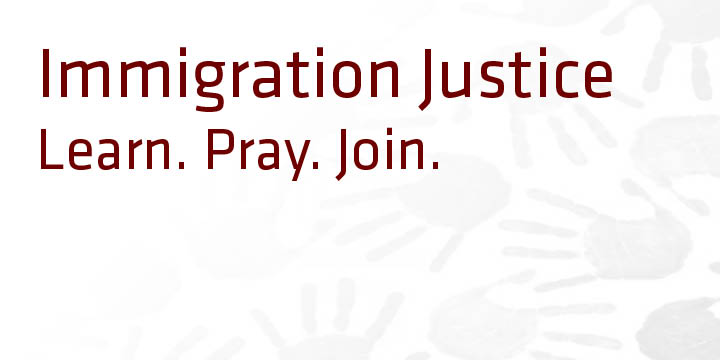 John Garland is the part-time pastor of San Antonio (Texas) Mennonite Church, in the heart of the city. His wife is a high school principal just over the river and his two daughters go to the neighborhood elementary school. He raises vegetables for the local market. Before San Antonio, John and the family lived on the southern border of Texas where he was the pastor of Iglesia Menonita Buenas Nuevas for eight years.
John Garland is the part-time pastor of San Antonio (Texas) Mennonite Church, in the heart of the city. His wife is a high school principal just over the river and his two daughters go to the neighborhood elementary school. He raises vegetables for the local market. Before San Antonio, John and the family lived on the southern border of Texas where he was the pastor of Iglesia Menonita Buenas Nuevas for eight years.
Over the course of three posts, John will offer some perspective on five facets of the refugee crisis on our southern border and five ways individuals and congregations can respond. Read part one and two here.
Part Three
Context
Compiled from the experience of a Mennonite pastor in San Antonio, there are included suggested Bible stories to read while you discern your response, a check on popular myths that surround this crisis, and a brief human anecdote from my experience here in this city.
The historical context is complicated, and the complexity of the current crisis is overwhelming. The root, however, is the extreme violence in Guatemala, El Salvador and Honduras, particularly against women. A brutal combination of gangs and corruption has resulted in horrors of human trauma that families are risking everything to escape. The journey through Mexico is extremely dangerous and violent, oftentimes controlled by trafficking cartels that mislead and extort the desperate refugees. If they make it to our border on this sacred journey to save their children, it is miraculous. They arrive traumatized and broken, holding on only to the glimmer of hope that the United States is a land of freedom.
Deported
The Circumstance: Fathers, mothers and entire families are being deported back to Central America after a desperate, month-long journey to escape death. They have spent their life-savings to escape their home, and are returned with nothing but the threats they left. Central Americans are flown on jets to their home capitals.
What you can do: Support the international missions, relief and aid agencies in the greeting of Central America deportees at their home airports. Resources for the first week could save lives. Their lost life-savings cannot be returned to them, but a merciful gift of sustenance seems just for those who believed in the false promise of safety in the United States.
 A False Myth: Deporting people keeps out criminals, deters more illegal immigration and saves our economy. In truth: Economically, deportation is very expensive and does little to deter the desperate attempts of other families. Further, we are rejecting the most successful, resourceful and driven families of Central America who were targets of violent extortion. Deportations invariably divide and destroy families.
A False Myth: Deporting people keeps out criminals, deters more illegal immigration and saves our economy. In truth: Economically, deportation is very expensive and does little to deter the desperate attempts of other families. Further, we are rejecting the most successful, resourceful and driven families of Central America who were targets of violent extortion. Deportations invariably divide and destroy families.
A Human: In a small church in northern Mexico, I met a man from Central America who thought he could find a new life for his family in the United States. He showed me scars from tortures at the hands of gangs, and forced tattoos that marked a death-sentence if he left his home territory. At the United States border he had been taken from his wife and daughter and quickly deported. With the hope of finding his family again, he chose to lie about his Central American nationality, was mistaken as a Mexican, and dropped off at a bridge over the Rio Grande. After six months of effort, and having desperately crossed the river illegally five times, he was living in this impoverished but hospitable church. He had not found any leads on the location of his wife and child and felt deeply depressed.
From Scripture: Read the letter Paul writes to Philemon. Much is unclear about details, but obviously Philemon has a legal right to exercise over Onesimus. Onesimus must have broken some law and his social status as a slave gives him no recourse for mercy. What is the powerful argument that Paul dismisses and what is the argument that Paul lands on? How does Paul refer to Onesimus, and what does he ask Philemon to do? If Onesimus is Paul’s heart, reflect on who is Christ’s heart.
______________________________________________________________________________
This post is part of MC USA’s Immigration Justice: Learn, Pray, Join initiative.
With hope we pray for justice for immigrants seeking peace, wholeness and safety in the United States and around the world. We invite congregation to use Peace Sunday prayers and worship resources: “A renewed peace church welcomes the stranger,” created by Mennonite World Conference for worship on Sept. 23.
Consider ways you can actively support immigration justice:
1. Learn skills to help facilitate intercultural competency and/or undoing racism processes in congregations through the Intercultural Development Inventory or invite one of the 18 qualified administrators across MC USA to work with your congregation.
2. Advocate for just and humane immigration policies for immigrants and refugees by contacting your local, state and national elected officials.
3. Offer church facilities and volunteers for immigration documentation services, language classes, mental health support, cultural celebrations, after-school homework help and other ministries.
4. Engage in mutual aid to offer food, shelter, clothing, housing, transportation and other resources to immigrants regardless of their status.
5. Donate to MC USA to support congregations and projects working with immigration justice initiatives addressing family separation, detention centers, Deferred Action for Childhood Arrivals (DACA) and legal assistance.

